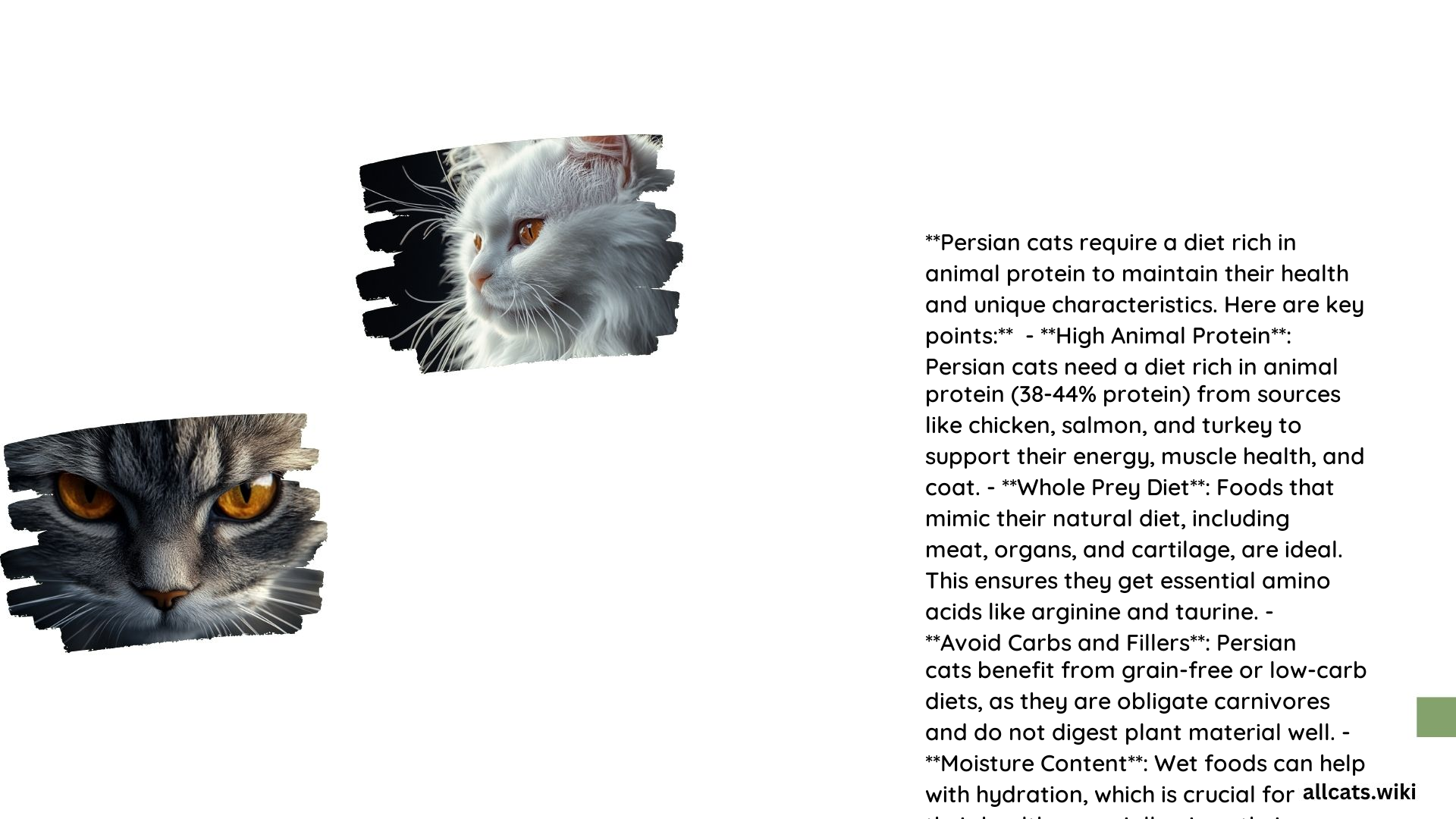Persian cats have specific dietary requirements due to their unique physiology and common health issues. Their diet needs to be tailored to address these needs, ensuring they receive the essential nutrients, support digestive health, and maintain a healthy coat.
Essential Nutrients for Persian Cats
Animal Protein
Persian cats, like all cats, are obligate carnivores and require a diet rich in animal-based protein. This includes sources such as chicken, turkey, fish, and other seafood. Animal protein provides essential amino acids like arginine and taurine, which are crucial for energy, muscle health, and a healthy coat.
Animal Fat
Animal fat is a vital secondary source of calories and contains essential fatty acids. It also enhances the palatability of the food, making it more appealing to Persian cats.
Vitamins and Minerals
A balanced diet for Persian cats should include vitamins and minerals that support overall health. For example, omega-3 fatty acids from sources like cod liver oil or salmon oil are beneficial for skin and coat health.
Common Health Issues and Dietary Considerations for Persian Cats
Digestive Issues
Persian cats are prone to digestive problems, including hairballs and gastrointestinal issues. Foods with highly digestible proteins and prebiotics can help alleviate these issues. Feeding a wet food diet can be beneficial as it provides an extra source of water and can be easier to digest.
Urinary Health
Persian cats are more susceptible to urinary tract issues, such as kidney stones. A diet that supports urinary health, with specific formulations to reduce the risk of these conditions, is recommended.
Coat Health
Given their long, opulent coats, Persian cats benefit from diets enriched with targeted nutrients that reinforce skin health and coat shine. Foods containing omega-3 and omega-6 fatty acids are particularly beneficial.
Feeding Schedule and Quantity for Persian Cats
Feeding Frequency
Cats are naturally adapted to eating small servings throughout the day. Feeding 7 to 10 times a day can be ideal, but for practicality, dividing the daily ration into 2-3 meals is common.
Water Intake
Ensuring access to clean, fresh water at all times is crucial. Persian cats may benefit from cat water fountains if they prefer running water.
Specialized vs. Standard Food for Persian Cats
Specialized Food
Due to their unique needs, Persian cats often benefit from specialized diets. For example, foods designed to help with hairball formation, urinary health, and digestive issues are highly recommended. Products like Royal Canin’s Persian-specific formulas and Husse’s Exclusive Digest are tailored to meet these needs.
Standard Food
While standard cat food can provide basic nutritional needs, it may not address the specific health issues common in Persian cats. Standard foods may lack the targeted nutrients and formulations that specialized diets offer.
Examples of Suitable Foods for Persian Cats
- Smalls Ground Bird Fresh Cat Food: Rich in animal protein and easily digestible, this food is suitable for Persian cats.
- Open Farm Cat Food: Packed with premium animal protein and low in carbohydrates, this food is a good option for Persian cats.
- Husse Exclusive Digest: Made with lamb and rice, this food is suitable for Persian cats with digestive issues and can be used as a novelty source of protein for those with food allergies.
References
- Best Cat Food For Persian Cats 2024 – This article provides detailed information on the dietary needs of Persian cats and recommends specific food products.
- Persian | Royal Canin AU – This resource outlines the nutritional requirements for Persian cats, including the importance of highly digestible proteins and specific formulations to support their health.
- Persian cat care and nutrition—the ultimate guide – This guide emphasizes the need for high-quality ingredients and natural feeding patterns, highlighting the importance of animal protein and fat in a Persian cat’s diet.

